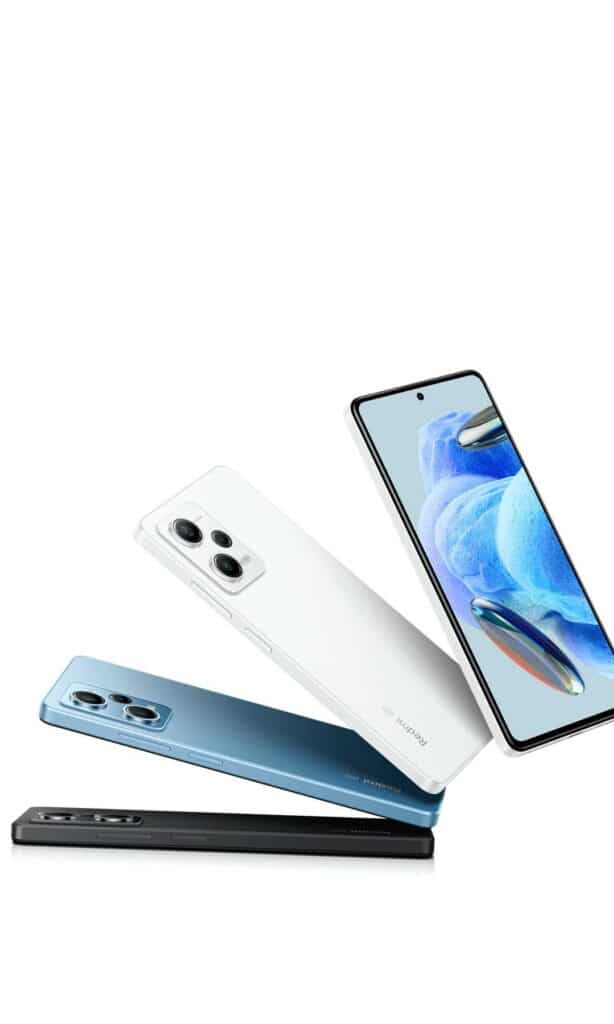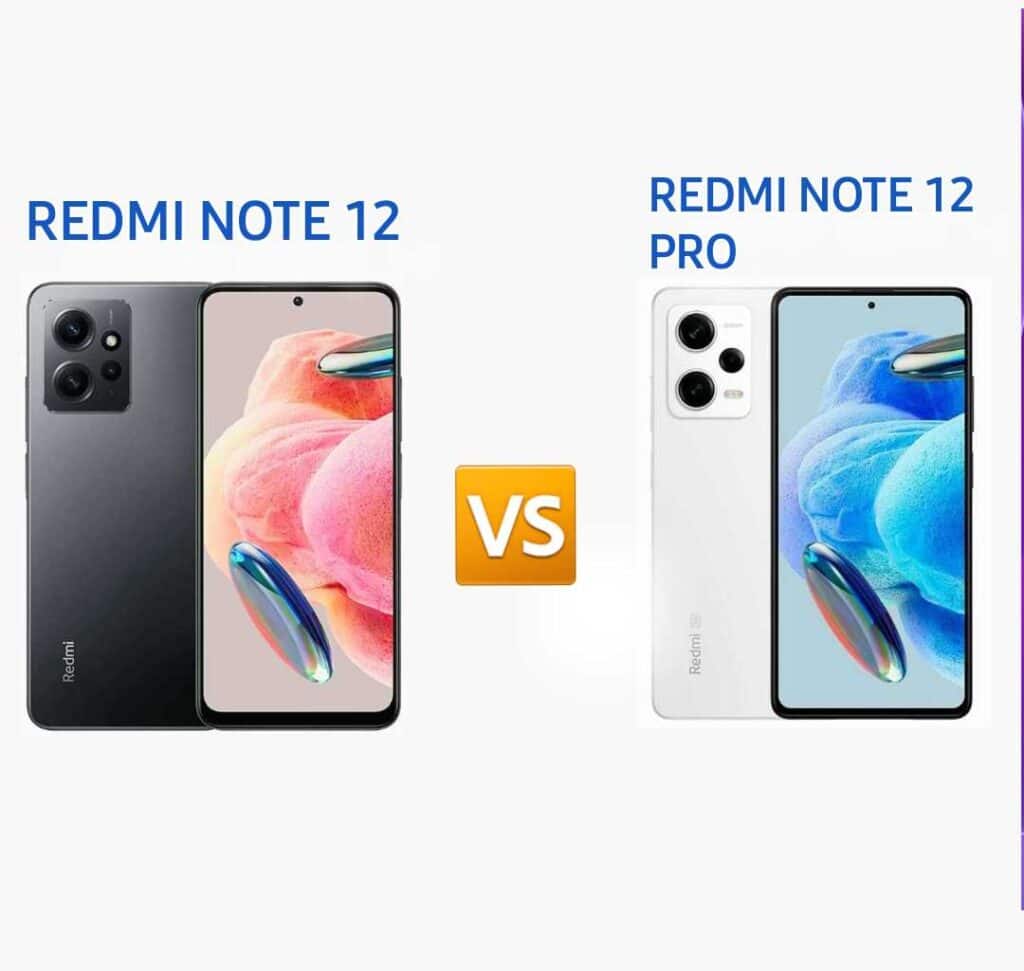The Xiaomi Redmi Note 12 Pro and Xiaomi Redmi Note 12 are part of Xiaomi’s popular Redmi Note series. Both smartphones offer impressive features at affordable prices, targeting different user needs.
Overview of Xiaomi Redmi Note 12 Pro vs. Xiaomi Redmi Note 12
| Feature | Xiaomi Redmi Note 12 Pro | Xiaomi Redmi Note 12 | Explanation |
|---|---|---|---|
| Launch Date | Released in January 2023 | Released in January 2023 | Both models launched simultaneously. |
| Body Dimensions | 162.9 x 76 x 7.9 mm | 165.9 x 76.2 x 8 mm | Note 12 Pro is slightly more compact, while the base Note 12 is marginally thicker and taller. |
| Weight | 187 g | 188 g | Redmi Note 12 Pro is slightly lighter, enhancing portability. |
| SIM | Dual SIM (Nano-SIM, dual stand-by) | Hybrid Dual SIM (Nano-SIM, dual stand-by) | Both devices offer Dual SIM support. The hybrid SIM slot in Note 12 accommodates microSD. |
| Build Quality | Glass front, plastic back, plastic frame | Glass front, plastic back, plastic frame | The glass front adds protection, while the plastic back keeps the phone light and durable. |
| Water Resistance | IP53, dust and splash resistant | IP53, dust and splash resistant | IP53 certification on both ensures protection against light splashes and dust, but neither is fully waterproof. |
| Display Type | AMOLED, 120Hz, HDR10, Dolby Vision | AMOLED, 120Hz, Corning Gorilla Glass 3 | Redmi Note 12 Pro offers superior display quality with HDR10 and Dolby Vision. |
| Screen Size | 6.67 inches | 6.67 inches | Both models share the same screen size. |
| Resolution | 1080 x 2400 pixels (~395 ppi) | 1080 x 2400 pixels (~395 ppi) | Both phones offer Full HD+ resolution. |
| Brightness | 1200 nits (peak brightness) | 1200 nits (peak brightness) | Excellent brightness levels on both devices. |
| Operating System | Android 12, MIUI 14 | Android 12, MIUI 14 | Both models run on MIUI 14 based on Android 12. |
| Processor (Chipset) | MediaTek Dimensity 1080 (6 nm) | Qualcomm Snapdragon 4 Gen 1 (6 nm) | The Dimensity 1080 in the Pro model offers higher performance than the Snapdragon 4 Gen 1 in the base model. |
| CPU | Octa-core (2×2.6 GHz Cortex-A78 & 6×2.0 GHz Cortex-A55) | Octa-core (2×2.0 GHz Cortex-A78 & 6×1.8 GHz Cortex-A55) | Both phones use an octa-core CPU, but the Redmi Note 12 Pro offers a higher clock speed. |
| GPU | Mali-G68 MC4 | Adreno 619 | The Mali-G68 MC4 in the Note 12 Pro is more powerful than the Adreno 619 in the Note 12. |
| RAM Options | 6GB or 8GB | 4GB, 6GB, or 8GB | Both phones come with RAM configurations up to 8GB, but the Note 12 starts at 4GB. |
| Storage | 128GB/256GB | 128GB/256GB | Both models offer 128GB and 256GB of internal storage. However, the Note 12 base model supports microSD expansion, while the Pro does not. |
| Expandable Storage | No | Yes (via microSD, uses SIM slot) | The base Note 12 allows for additional storage with a microSD card, which the Pro model lacks. |
| Main Camera Setup | 50 MP (wide), 8 MP (ultrawide), 2 MP (macro) | 48 MP (wide), 8 MP (ultrawide), 2 MP (macro) | Both phones feature a triple camera setup. The Note 12 Pro has a higher resolution main camera. |
| Main Camera Features | Dual-LED flash, HDR, panorama | Dual-LED flash, HDR, panorama | Both models come equipped with similar camera features. |
| Video Recording | 4K@30fps, 1080p@30/60fps | 1080p@30fps | The Pro model supports 4K recording. |
| Selfie Camera | 16 MP (wide) | 13 MP (wide) | The Note 12 Pro has a higher resolution selfie camera. |
| Selfie Camera Video | 1080p@30fps | 1080p@30fps | Both models support Full HD video recording for selfies. |
| Audio Features | 24-bit/192kHz audio, stereo speakers | 24-bit/192kHz audio, stereo speakers | Both devices deliver high-quality audio output with stereo speakers and 24-bit audio. |
| 3.5mm Jack | Yes | Yes | Both models retain the 3.5mm headphone jack. |
| Battery Capacity | 5000 mAh | 5000 mAh | Both models have a 5000 mAh battery. |
| Fast Charging | 67W wired, 50% in 15 minutes | 33W wired, 50% in 22 minutes | The Note 12 Pro supports faster charging with its 67W charger, reducing charging time significantly compared to the 33W charging on the base model. |
| Connectivity | 5G, LTE, Wi-Fi 802.11 a/b/g/n/ac, Bluetooth 5.2 | 5G, LTE, Wi-Fi 802.11 a/b/g/n/ac, Bluetooth 5.1 | Both phones support 5G connectivity and have similar wireless options, though the Pro model features slightly newer Bluetooth 5.2 technology. |
| USB | USB Type-C 2.0, OTG | USB Type-C 2.0, OTG | Both models feature USB Type-C ports and OTG support. |
| NFC Support | Yes (market/region dependent) | Yes (market/region dependent) | NFC is supported on both models. |
| Sensors | Fingerprint (side-mounted), accelerometer, gyro, proximity, compass | Fingerprint (side-mounted), accelerometer, gyro, proximity, compass | Both phones offer side-mounted fingerprint sensors for quick and secure. |
| Available Colors | Black, Blue, White | Frosted Green, Matte Black, Mystique Blue | Both models come in a variety of color options, with the Note 12 Pro offering a more |

Explanation of Key Differences
- Performance and Processor:
The Xiaomi Redmi Note 12 Pro features a MediaTek Dimensity 1080 chipset, which delivers superior performance, and running demanding apps. On the other hand, the Xiaomi Redmi Note 12 is powered by a Qualcomm Snapdragon 4 Gen 1 chipset, which provides solid performance for everyday use, but falls short compared to the Pro model when handling intensive tasks. - Display Quality:
Both models come with 6.67-inch AMOLED displays, offering vivid colors and a smooth 120Hz refresh rate. However, the Redmi Note 12 Pro offers additional features such as HDR10 and Dolby Vision, which significantly enhance the viewing experience by delivering richer contrast and more detailed imagery. - Camera Setup:
In terms of photography, the Redmi Note 12 Pro stands out with its 50 MP main camera, compared to the 48 MP camera on the base model. The Pro version also supports 4K video recording, making it ideal for content creators who require high-resolution video. Although the Redmi Note 12 has a capable camera, it doesn’t offer the same level of detail and sharpness as the Pro model, especially in challenging lighting conditions. - Charging Speed:
One of the biggest differentiators between the two models is their charging capability. The Redmi Note 12 Pro supports 67W fast charging, which allows you to charge up to 50% in just 15 minutes. In comparison, the Redmi Note 12 supports 33W fast charging, which is slower but still fast enough to provide a decent charge within a short time frame. - Memory and Storage:
Both models offer similar RAM and storage options, but the Redmi Note 12 Pro is better suited for heavy multitaskers due to its more powerful processor and optimized RAM management. The Redmi Note 12 starts at 4GB RAM, which is sufficient for light users but may not be enough for users who run multiple apps simultaneously or use resource-intensive applications. - Expandable Storage:
The Redmi Note 12 offers expandable storage via a microSD card slot, giving users the flexibility to increase their storage capacity. This feature is missing in the Redmi Note 12 Pro, which relies solely on internal storage.

